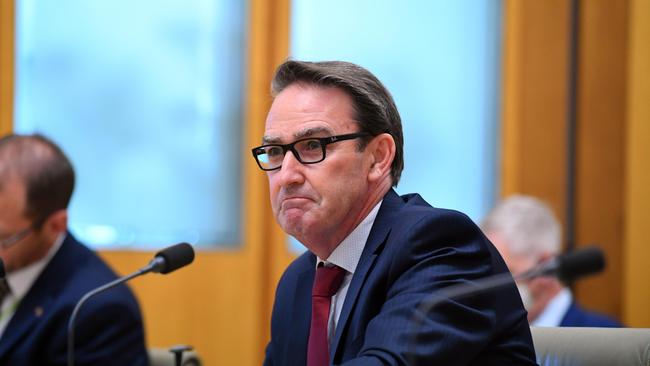Flood disaster $10bn drain on Australia’s economy: Treasury secretary Steven Kennedy
The devastating east coast floods will slash $10bn off economic growth over the first three months of the year, Treasury secretary Steven Kennedy says.

The devastating east coast floods will slash $10bn off economic growth over the first three months of the year, Treasury secretary Steven Kennedy says.
Dr Kennedy said “the floods in Queensland and NSW have generated severe hardship for affected communities”.
“Individuals and communities affected by the floods face destruction of their home or place of work, temporary displacement, loss of incomes, and a long road to recovery,” he told Senate estimates in Canberra on Friday while revealing March-quarter real GDP would be 0.5 per cent lower as a result.
“The impact will be felt through reduced activity mainly in the local agriculture, mining, retail trade, accommodation and food services, and construction industries.”
These economic losses would be partially made up, however, through reconstruction activity over coming months, he said.
Dr Kennedy warned that the emergence of a new, more virulent Covid-19 strain on par with January’s Omicron outbreak would potentially cost the economy an additional 0.5 per cent of GDP and lift unemployment by 0.25 percentage points – equivalent to the loss of about 30,000 jobs. While this was not the most likely of Treasury’s scenarios, he noted the pandemic remained a “substantial” risk to the outlook.
“We expect that future waves of Covid will occur and this remains a risk to the outlook,” the Treasury boss said.
“But given our high vaccination rates and increased immunity in the community, our ability to live with Covid has improved and the impact of future waves is expected to be modest unless a significantly more virulent strain emerges.”

Dr Kennedy said he was seeing “a real strengthening in the economic prospects of the regions”, adding that it was essential the regions’ growing prominence and popularity be matched with improved infrastructure.
The budget on Tuesday night announced an additional $10.7bn regional package of infrastructure, telecommunications upgrades and measures aimed at boosting economic activity.
Dr Kennedy said it was critical this extra infrastructure money “goes to the right places and the decisions are made mindful of the best return for the dollar”. “As long as they (infrastructure projects) are well done and well planned, they could deliver very significant returns,” he said.
Despite these “substantial risks” to the outlook here and abroad – from Covid to the Ukraine war – Dr Kennedy remained confident that the economy would prove resilient.
He said wage growth would continue to increase, although pay rises have been “slower to emerge” than would be anticipated from the low unemployment rate, which Treasury expects will drop to 3.75 per cent in the second half of this year.
Amid a series of questions around falling real wage growth, Dr Kennedy noted that other measures of income growth – such as average hourly earnings which includes bonuses, overtime and pay rises from job switching – were growing more rapidly than inflation.
Dr Kennedy said the damage this year to China’s economy from its Covid outbreak could prove greater than in 2021.
Unlike many other countries, Australia’s largest trade partner has not moved on to a phase of living with the virus, and has instead maintained a zero-tolerance approach to new cases.
“Recent Covid-19 outbreaks in China’s port cities and manufacturing regions, including lockdowns in Shanghai over the past week, demonstrate the continued risk the pandemic poses to supply chains,” Dr Kennedy said.





To join the conversation, please log in. Don't have an account? Register
Join the conversation, you are commenting as Logout